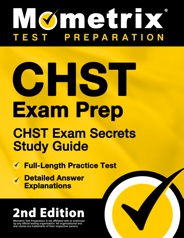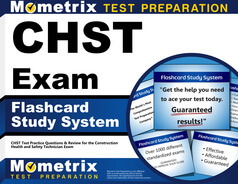The Board of Certified Professionals (BCSP) administers the Construction Health and Safety Technician (CHST) exam to certify those seeking part-time and full-time work in the field.
Click “Start Test” above to take a free CHST practice test!
CHST Exam Eligibility
To be eligible to take the CHST exam, you must work part-time or full-time in construction safety. You must also have at least three years of experience, with at least 35% of the job related to construction safety, health, and environmental practices.
CHST Outline
The CHST exam contains 200 multiple-choice questions and has a time limit of four hours.
The exam is split into four content domains, and the questions in each domain are split into two categories: Skills and Knowledge.
1. Hazard and Risk Identification and Control (36.6%)
The Knowledge questions in this domain evaluate the following:
- The Globally Harmonized System of Classification and Labeling of Chemicals (GHS)
- Basic testing and monitoring equipment
- Principles of ergonomics
- Basic safety through design
- Fall protection
- Common biological hazards
- Requirements, usage, and limitations of personal protective equipment
- Risks associated with multiple trades working in one work area simultaneously
- Electrical hazards and controls
- Mechanized equipment
- Caught-in/caught-between hazards and associated controls
- Struck-by hazards and associated controls
Other common hazards and associated controls
- Hot work
- Excavations
- Working in confined spaces
- Working at heights
- Rigging and hoisting
- Operating cranes
- Handling and storing materials
- Housekeeping
- Concrete work
- Powder actuated tools
- Hand and power tools
- Exposure to asbestos
- Exposure to lead
- Exposure to noise
- Exposure to silica
- Exposure to radiation
- Exposure to chemicals
- Exposure to extreme temperatures
- Exposure to vibration and impact
The Skills questions in this domain test your ability to develop hazard safety analyses, verify the effectiveness of corrective actions, prioritize hazards based on risk level, select instruments designed for measuring a particular hazard, and address hazards over changing construction site conditions.
2. Emergency Preparedness, Incident Investigation, and Response (19.9%)
The Knowledge questions in this domain evaluate the following:
- Common elements of response plans for environmental hazards
- Proper fire protection and prevention methods
- Universal precautions
- Components of emergency action plans
- Emergency response system
- Potential first aid/medical needs
The Skills questions in this domain test emergency planning and mitigation, action plans, coordination, and responses.
3. Safety Program Development, Implementation, and Sustainment (22.5%)
The Knowledge questions in this domain evaluate the following:
- Common components of site-specific safety plans
- Basic risk management concepts
- Applicable health and safety standards
- The impact of regulatory authority on roles and responsibilities
- Proper use of equipment
- Data gathering
- Post-incident reporting and follow-up
- Worksite inspections and/or audits
- Determining incident or accident causes
The Skills questions in this domain simply test your ability to apply relevant worksite condition standards, evaluate the safety impacts of construction means and methods, identify which health and safety programs are relevant, and identify incident and accident trends.
4. Leadership, Communication, and Training (21%)
The Knowledge questions in this domain evaluate the following:
- BCSP Code of Ethics
- Communication strategies
- Risk management
- Available training delivery methods
- Consulting with equipment manufacturers, suppliers, or subject matter experts
- Appropriate behavior motivation methods
- Leadership strategies
- Information confidentiality
The Skills questions in this domain test your ability to coach personnel to correct unsafe behaviors, recognize and address total worker health, determine training requirements and delivery methods, access relevant current information, maintain all applicable documentation, develop site-specific safety training, and recognize situations that present imminent danger.
Check out Mometrix's CHST Study Guide
Get practice questions, video tutorials, and detailed study lessons
Get Your Study Guide
Registration
To register for the CHST exam, you must first create an online BCSP account. Through your account, you can then select “CHST” as your certification of choice and fill out the application. You will be asked to provide your contact information, proof of your BSCP-qualified credential, and your experience and education information.
Once the application is filled out, you will need to submit it along with the $140 application fee.
Once your application is approved, you will have a full year from the date of approval to register and sit for the exam. During registration, you will need to pay the exam fee of $300. You can schedule your exam at any time with Pearson VUE.
Test Day
On the day of your exam, you should arrive at the testing location 15-30 minutes before the exam is set to begin. Once you arrive, you must sign in and present your photo ID to the proctor. You will be photographed and asked to sign a roster and other rule forms.
Personal items are not allowed in the testing room, so they should be left at home or in your car. All electrical devices, including cell phones, are prohibited.
Just before the exam starts, you will receive a brief tutorial on the testing system. You will also be given everything you need to work out any calculations by hand (no calculator will be provided).
How the Test is Scored
BCSP uses the modified-Angoff method and the Bookmark Standard Setting method to establish the scores for the CHST exam. They use these methods to ensure that your score is based entirely on your testing performance and does not rely on how well other test-takers performed.
You will get your results immediately after completing the exam. As long as you achieve the minimum cumulative score for the entire test, you will have passed, even if you did not pass all four domains individually.
Even though you don’t need to pass each individual domain, your score report will show you how you performed on each one. This is useful for understanding your strengths and weaknesses, especially if you did not pass and need to retake the exam. Currently, the minimum passing score is 140 out of 200.
Check out Mometrix's CHST Flashcards
Get complex subjects broken down into easily understandable concepts
Get Your Flashcards

CHST Online Prep Course
If you want to be fully prepared, Mometrix offers an online CHST prep course designed to give you everything you need to succeed!
Here’s what you’ll find in the CHST course:
- 60+ Review Lessons Covering Every Topic
- 600 CHST Practice Questions
- 300+ Digital Flashcards
- Money-back Guarantee
- Mobile Access
Everyone learns differently, so we’ve tailored the CHST online prep course to ensure every learner has what they need to prepare for the CHST exam.
Click below to check it out!
FAQs
Q
How many questions are on the CHST exam?
A
There are 200 multiple-choice questions on the exam.
Q
How long is the CHST exam?
A
The time limit for the exam is four hours.
Q
What is the passing score for the CHST exam?
A
To pass the exam, you must achieve a score of at least 140.
Q
How much does the CHST exam cost?
A
The application fee is $140, and the examination fee is $300 ($440 in total).


